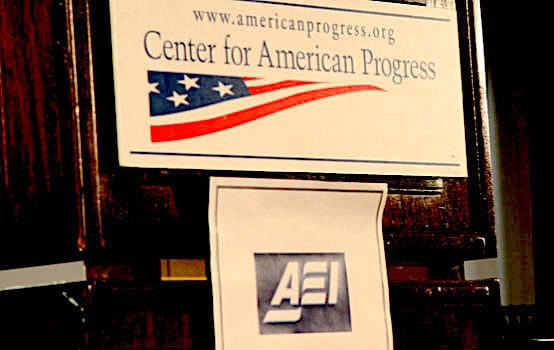Neocons and Liberals Join Forces to Fight Populism

For several months, an alliance has been forming between the neoconservative American Enterprise Institute (AEI) and the neoliberal Center for American Progress (CAP). It’s the sort of kumbaya not witnessed since wartime Washington a decade ago.
A press release from CAP on May 10 blares: “CAP and AEI Team up to Defend Democracy and Transatlantic Partnership.” The same joyous tidings accompanied a public statement issued by AEI on July 31, which stressed that the alliance was meant to resist “the populist assault on the transatlantic community” for the purpose of “defending democracy.”
Although, according to Vikram Singh, a senior fellow at CAP, the two partners “often disagree on important policy questions,” they have been driven together “at a time when the character of our societies is at stake.” This burgeoning cooperation underscores that “our commitment to democracy and core democratic principles is stronger than ever.” Since both documents fling around the terms “democracy” and “liberal democracy” to justify a meddlesome foreign policy, we may safely assume that the neocons are behind this project. Neocons for some time now have prefixed their intended aggressions with “democracy” and “liberal democracy” the way the Spanish and Austrian Habsburgs during the 16th and 17th centuries stuck the word “holy” into the names of their wartime alliances. Closer to our time, communist governments favored the use of “people’s democracy” to indicate that they were the good guys. Presumably the neocons have now picked up this habit of nomenclature.
Ironically, the new neocon-shaped think tank alliance is no more interested in what it claims to want, namely democracy, than its former Soviet rulers were. AEI has attacked Britain’s decision to leave the European Union as symptomatic of “populist attacks on traditional structures of international affairs such as the EU and international trade regimes.” It is in this context, we are told, that NATO has “appeared to be a second-rate concern” and that the globalization that “ushered in unprecedented worldwide growth” has been placed in peril. Leaving aside other critical analyses of globalism that call into question AEI’s enthusiasm for neoliberal economics, the more relevant question is: why is it “undemocratic” for a nation to vote in favor of leaving the EU? And for that matter, why is it “undemocratic” for countries to reconsider their membership in NATO?
Moreover, who are these “authoritarian” bad guys that CAP now has in its crosshairs and plans to rid the world of with its new neocon pals? Presumably it’s the right-of-center governments in Eastern and Central Europe, as personified by favorite leftist whipping boy Viktor Orban. Although CAP doesn’t want to be especially “confrontational” in dealing with its villains, or so it claims, it also proclaims that “authoritarian regimes pursue different objectives than societies with governments that are accountable to the people and respect the rule of law.” It might be useful for CAP to tell us how exactly Hungary, Poland, and other right-of-center European governments have not been democratically elected and have disrespected their countries’ legal traditions.
Fortunately our think tank alliance is in still in no position (heaven be thanked!) to impose its will. The most these hysterical complainers can do is air their grievances and misrepresent them as somehow “preserving democracy.” All AEI and CAP have done is to take a multitude of grievances—e.g., America’s failing to oppose adequately China’s cyberthreats, putting up with Russia’s aggression, “security threats” in general, and nuclear proliferation—and mixed them together with standard leftist boilerplate about Orban’s “illiberalism” and “sharing our values.” This, of course, is indicative of the neocon tactic of linking whatever its advocates see fit to address to a supposed common purpose, which is saving democracy from whatever is defined as “antidemocratic.”
For those who wonder what AEI, as a supposedly right-of-center foundation, is doing hanging out with CAP, such hobnobbing between Republican policy foundations and left-of-center tanks has been going on for a while. In December 2015, AEI and Brookings both proudly announced their cooperation in drafting a poverty program that emphatically diverged from the one proposed by then-candidate Trump. Both foundations called for, among other reforms, raising the minimum wage and greater government guidance for poor families.
What’s new about the AEI/CAP “partnership of peril,” however, is the degree of collaboration taking place and the unmistakable whiff of “never Trump” among their scholars and writers. It would also appear that as the price of collaboration, AEI has been required to join its more leftist partner in going after democratically elected right-of-center political leaders in Europe. This recalls all too vividly the Soviet practice of purging “undemocratic”—that is, uncongenial—governments while taking over Eastern Europe at the end of the Second World War. Today it’s an establishment think tank world where governments elected fairly by their people are declared not democratic enough.
Paul Gottfried is Raffensperger Professor of Humanities Emeritus at Elizabethtown College, where he taught for 25 years. He is a Guggenheim recipient and a Yale Ph.D. He is the author of 13 books, most recently Fascism: Career of a Concept and Revisions and Dissents.
Comments